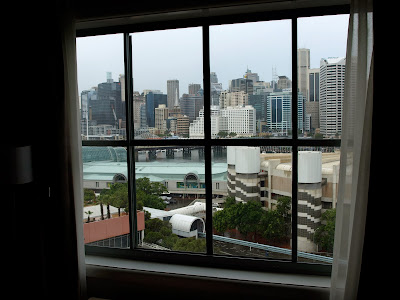 |
[Johann Sebastian Bach, ca, 1745] |
Is this the future? I am sitting in Sydney’s airport having
a desultory conversation with a young Australian of Indian descent. He’s
on his way to visit family in Calcutta.
We speak of the usual things: travel, work, family. He lives
in Sydney, and loves it for its shopping. But being temporarily out of work in
the IT industry here, he’s off to work for his uncle back in India.
I ask him about Calcutta, and he describes a vibrant, busy
city that’s "great for shopping". I quiz him about India’s wilder parts. He has
been to the Himalayan foothills a couple of times. But he feels quite uncomfortable in
the countryside (and here he gives a little shudder). He doesn’t care to be
long away from the city’s bustle … and its shopping.
He asks about Tasmania. I tell him about its mountains,
its beautiful wild places, its relaxed life-style. When he asks about its
shopping scene, I have to disappoint him. “You wouldn’t come to Tasmania just
for its shopping.” He nods, and turns to his smart phone for a facebook fix.
Have I struck an unusually shopping-obsessed,
nature-phobic character? A few days in Sydney incline me to think him not atypical: that this may be the shape
of the future. Retail therapy, device-addiction and a deep fascination with “stuff”
are on show everywhere in Australia’s biggest city. They all point in the same
direction: many of us prefer the worlds of our own creation to those of nature.
I disembark a ferry in Cockle Bay, near Darling Harbour.
There is not the slightest chance that a cockle could live here any more. There
is no bay, no natural shoreline, no rocky coast: in short no habitat for the
life form that gave this place its name. All is tarred and tamed to the service of commerce.
 |
[Looking over Cockle Bay and Darling Harbour, Sydney] |
A few days later I am back home, ruminating on my Sydney
visit and listening to some J.S. Bach. I've heard that some 200 years ago, at about the same
age as my young Indian Australian, Bach walked 260 miles (420 km) across
Germany to hear and learn from the famous organist/composer Dietrich Buxtehude.
I suppose the young have always travelled for inspiration
and the prospect of work. But which of us would have done it all on foot? And what
have we lost in our ability to travel quickly and easily; to stay in touch
instantly; to gather information in seconds rather than months or years?
We know little detail of the 20 year old Bach’s journey,
so I can only conjecture. I see him with a staff in his hand, a satchel over his shoulder. He wonders about his
life as he moves from village to town, from city to hamlet. His head is full
of creative thoughts, ‘though he is still two years away from publishing his
first musical work.
It is winter, cold and wet, and the young Bach can’t
always find or afford dry shelter. He sees – and feels – the rain, fog, snow
and sometimes sun. He watches the sky, sees the birds, the tracks of animals in
the snow. Is that a wolf he hears?
Whatever else his journey encompassed, it gave Bach a real
and constant exposure to the natural world (what he would have called God’s
creation) as well as the social order. While Bach may have become a singularly
extraordinary composer, his experience of travel – and of the natural world –
was commonplace for his time. Is it any wonder that Bach, a devout Lutheran Christian,
repeatedly – and brilliantly – invoked God’s creation in his subsequent
compositions?
 |
[Awe inspiring tall trees in a Tasmania forest] |
Were Bach to write a letter to the current generation, I am sure
that faith would figure prominently. But I suspect the letter might also suggest that we get outside and experience creation a little more often; that it is no bad thing to be overawed by its wonders. I wonder would it be too much to ask him to also put his ideas in a facebook status update?
No comments:
Post a Comment